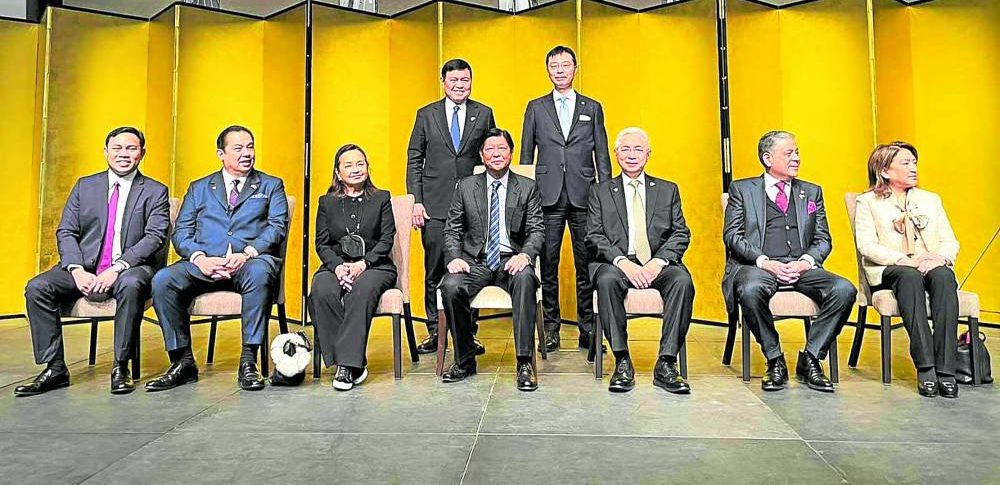
FINDING PARTNERS President Marcos witnessed the signing of 35 letters of intent between the Philippines and Japanese companies, including a joint venture agreement between Vista Land chair Manuel Villar Jr. (standing, left) and Mitsubishi Estate Co. Ltd. senior executive officer Yutaro Yotsuzuka. Also at the signing, one of themajor highlights so far of the President’s five-day working visit to Tokyo, were Sen. Mark Villar, Speaker Martin Romualdez, former President Gloria Macapagal-Arroyo, Trade Secretary Alfredo Pascual, Special Assistant to the President Antonio Lagdameo Jr. and PhilippineAmbassador to Japan Mylene Garcia Albano. —CONTRIBUTED PHOTO
TOKYO—Halfway through his five-day working visit here, President Marcos witnessed the signing of 35 letters of intent (LOIs) with several Japanese companies, assuring them of ease of doing business in the Philippines.
In a speech before business leaders on Friday morning, the President said “We have eased restrictions on foreign nationals to own businesses in the Philippines. The Philippine government is also enabling cross-cutting mechanisms to ease investments. Very soon, you can expect reduced transaction costs in doing business in the Philippines.”
Development deals
These efforts, he said, were “vital and game-changing reforms to improve the country’s business environment.”
“It is our hope that companies such as yours will not only find the Philippines to be an attractive investment destination. We are designing our efforts to encourage you to stay and find our country to be a place where your businesses will thrive,” he added.
The 35 LOIs between the Philippines and Japan included partnerships in manufacturing, infrastructure development, energy, transportation, healthcare, renewable energy and business expansion to improve foreign investor confidence.
The signing came a day after Marcos sat down for a bilateral meeting with Japanese Prime Minister Fumio Kishida.
Marcos expressed hope that Japanese investors would “find it encouraging that our national priorities align with building an enabling environment for companies like yours.
”He cited the passage of economic liberalization measures —such as the Retail Trade Liberalization Act, Public Service Act, Foreign Investments Act and Corporate Recovery and Tax Incentives for Enterprises Act—as steps taken by the government to “offer more encouraging incentives to support foreign businesses, including those from Japan.”
Marcos later attended a networking event organized by the Japan Chamber of Commerce and Industry, Japan-Philippines Economic Cooperation Committee, Mitsubishi Corp. and Marubeni Corp.
He was accompanied by former President and Senior Deputy Speaker Gloria Macapagal-Arroyo, Senate President Juan Miguel Zubiri, Speaker Martin Romualdez, Special Assistant to the President Secretary Antonio Lagdameo, Trade Secretary Alfredo Pascual and Finance Secretary Benjamin Diokno.
‘Shared value’
Several Japanese companies expressed their support for the Marcos administration’s development agenda: the Japan Chamber of Commerce and Industry, Sumitomo Chemical Co., Ltd., Sompo Holdings, Inc. and Marubeni Corp.
Masakazu Tokura, Keidanren chair and Sumitomo Chemical Ltd. chair, noted that “the Philippines and Japan share a fundamental value of freedom and democracy.”
Marcos said Tokyo’s pandemic assistance to Manila became “central to our policy for the recovery and the transformation of the Philippine economy.”
He said the two countries both saw how their respective micro, small and medium enterprises (MSMEs) went through “a very, very rough time during the lockdowns,” with many going out of business while still doing their best to support their employees.
DTI-Jetro accord
Also on Friday, the Department of Trade and Industry (DTI) reported that Secretary Pascual cosigned agreements with Japanese business representatives.
These include a memorandum of cooperation between DTI and Japan External Trade Organization (Jetro), represented by its chair and chief executive Nobuhiko Sasaki.
A DTI statement listed the 35 signed LOIs involving the following companies and specific business activities: Asti Corp. (for wiring harness manufacturing); Brother Industries Ltd. (printer manufacturing); DoubleDragon Corp./Iwata Chizaki Inc. (hotel construction); Itochu Corp. (pineapple production); Japan Tobacco Inc. (factory expansion project); Kurabe Industrial Co Ltd. (autoparts factory); Marubeni Corp. (energy, transport, health-care and afforestation projects);
MinebeaMitsumi Inc. (optical image stabilizer and solar factory); Mitsubishi Corp. (infrastructure, construction, transportation, commercial and real estate development); Mitsubishi Motors Corp. (automobile manufacturing); Nidec-Shimpo Corp. (speed reducer gear manufacturing); Nomura Real Estate Development Co. Ltd./ GT Capital Holdings (property development); Renova, Inc. (renewable energy); Sojitz Corp. (property development and telecommunications project); Taiheiyo Cement Philippines Inc. (kiln renewal, distribution terminal and berth reinforcement project).
Tamiya Inc. (plastic models, RC cars factory); TDK Corp (HDD heads and components project); Toyota Motor Corp. (light commercial vehicle manufacturing project); and Yamaichi Electronics (IC sockets factory); Kawasaki Heavy Industrie /Aboitiz/Amber Kinetics/IKS Co. Ltd. (energy storage technology project); Ubicom Holdings Inc./Advanced World Systems Inc. (software development outsourcing project).
Department of Environment and Natural Resources/Marubeni Corp./Dacon Corp. (joint credit mechanism project); Hitachi, Ltd. and Filinvest Development Corp. (development and desalination facilities for Metro Cebu).
Sumitomo Corp. (North South Commuter Rail/Metro Manila Subway rolling stock project); Oriental Energy and Power Generation Corp./Marubeni Corp. (renewable energy plants).
Murata Manufacturing Co. Ltd.’s (ceramic capacitors factory); Kenko Tokina Co. Ltd. (telescope factory); Hankyu Hanshin Properties Corp. and W Landmark Inc. (REIT coinvestment and real estate joint venture); and JeraCo. Inc. and Aboitiz Power Corp. (ammonia and hydrogen value chains development and feasibility study on ammonia co-fired power generation).Sojitz Corp. and Maestro Holdings, Inc. (health-care, logistics, warehousing, education); Vista Land & Lifescapes Inc. and Mitsubishi Estates Co. Ltd. (housing project); and Bases Conversion and Development Authority and New Energy and Industrial Technology Development Organization (smart mobility development).
MSME support
Also at the signing, Go Negosyo founder Joey Concepcion thanked the Japanese government for supporting MSME development through entrepeneurial mentorship.Through the Japan-Asean Integration Fund, Tokyo extended a $681,339 grant to the Asean Mentorship Entrepreneurs Network (Amen), one of the efforts covered by the 35 agreements.

